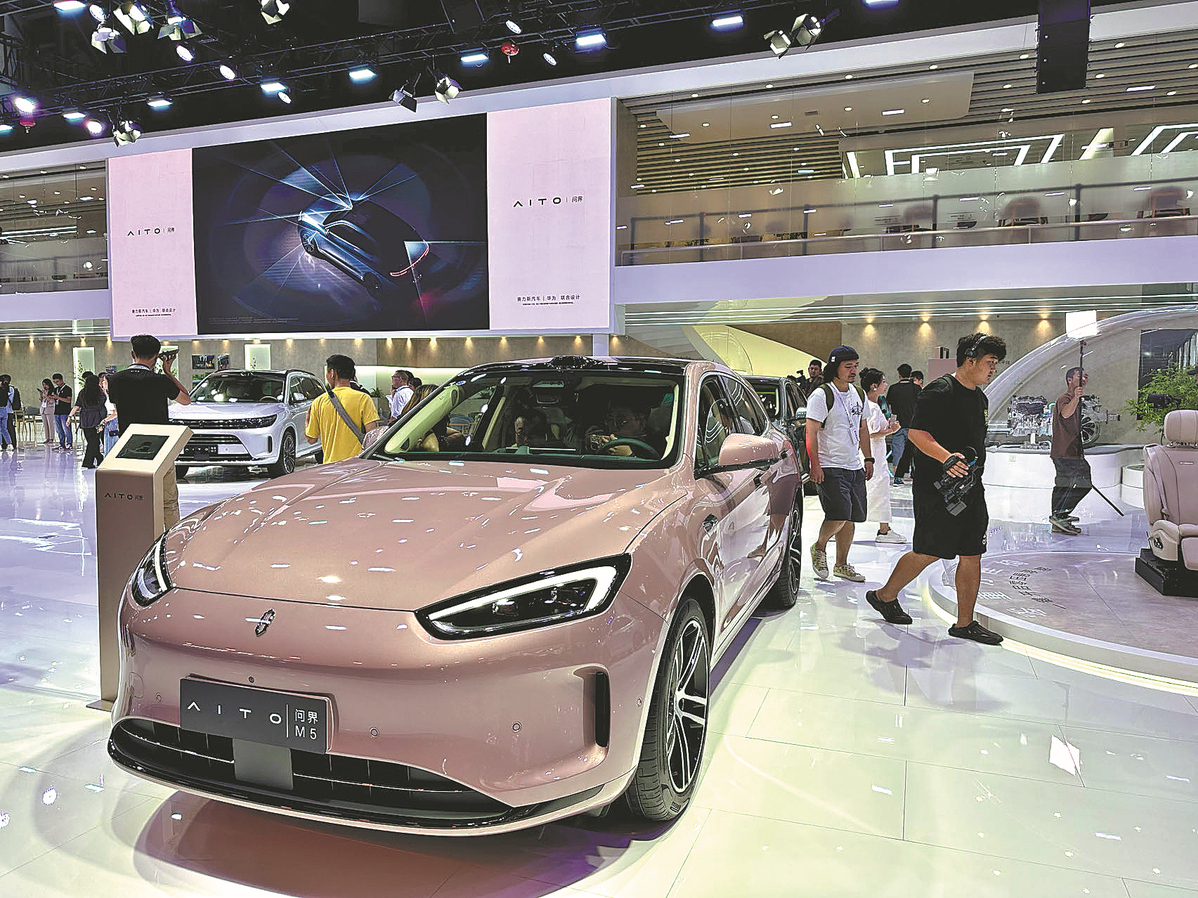
Seres showcases the AITO M5 at the Chengdu auto show in August. [LI FUSHENG/CHINA DAILY]
New energy vehicle makers in China saw rising deliveries in January, which is usually not a popular car-buying month. Analysts said the good start is expected to drive the burgeoning sector to a new high in the year.
Car buyers would usually prefer to place orders at the end of a year as there would be promotions and discounts. The pattern, coupled with the New Year and Spring Festival holidays that fall in January and February, normally hurt sales in the first quarter, said the analysts.
However, many carmakers started the year with promising results. Warren Buffett-backed BYD saw its best January, delivering 201,493 vehicles. Although around one-third lower than its December sales, the deliveries were up 33 percent year-on-year.
Great Wall Motor, China’s largest SUV maker, sold 24,988 NEVs, soaring 295.8 percent year-on-year. It came after the carmaker put in place a comprehensive electrification strategy in 2023, which it used to launch 15 NEV models.
Startups witnessed continued momentum as well. Zeekr, the premium electric vehicle brand of Geely, sold 12,537 vehicles in January, up 302 percent year-on-year, driven by its new model, the 007, which hit the market that month.
Nio delivered 10,055 vehicles in the same month, up 18.2 percent year-over-year. Its cumulative deliveries reached 459,649 by the end of January.
Also in January, the New York-listed startup signed strategic partnership agreements with JAC and Chery on battery swapping, following an announced cooperation with Changan and Geely.
The deals are expected to enhance the appeal of its battery-swapping technology to potential car buyers, said analysts.
Shanghai-listed Seres said its NEV sales in January soared 654 percent year-on-year, primarily driven by AITO-branded vehicles.
Seres sold 36,838 NEVs in January, of which 32,973 units near the AUTO marque co developed by the Chongqing-based carmaker and Chinese technology giant Huawei.
The new AITO M7 accounted for the large majority of the marque’s deliveries in January, which saw the model’s monthly sales exceed 30,000 units for the first time.
Yu Chengdong, head of Huawei’s smart vehicle unit, said he was proved “conservative” about AITO’s sales estimates after the results were released. “You all say I am ‘way too ambitious’ but now it seems that I am ‘way too conservative’,” said Yu in a Sina Weibo post.
Seres said it has received more than 140,000 orders for the new AITO M7 model, which together with the M9 is expected to drive a new round of growth for the Shanghai-listed company.
The company’s operating revenue in 2023 is expected to reach 35.5 billion yuan ($4.94 billion) to 36.5 billion yuan, according to its filings to the Shanghai Stock Exchange.
Its net profit attributable to the parent company in the same year is estimated to be up 29.5 percent to 45.1 percent compared with 2022.
The growth momentum is expected to strengthen as new models from both Chinese carmakers and international companies hit the market.
Among others, BMW launched its electric i5 sedan in late January, which became its seventh electric model available in China. The long-range version of Kia’s EV5 SUV hit the market on Thursday.
With the rise in the popularity of NEVs, charging infrastructure is improving as well. The number of NEV charging facilities in China grew 65 percent year-on-year in 2023, reaching almost 8.6 million by the end of the year, said Zhang Xing, the National Energy Administration’s spokesperson.
Charging facilities were built in 6,328 expressway service areas, or 95 percent of the country’s total, by the end of 2023, he said. The NEA has promoted the building of charging facilities in rural areas to tap the potential of NEV sales, Zhang added.
Zhang said the NEA will continue to expand the country’s network of charging facilities to meet the growing demand for electric cars.
In 2023, the country’s production and sales of NEVs exceeded 9.58 million and 9.49 million units, surging 35.8 percent and 37.9 percent year-on-year, respectively, data from the China Association of Automobile Manufacturers showed.
Ron Zheng, a senior partner of Roland Berger, said NEV sales this year will exceed 10 million units in China, with sales of EVs to grow by 30 percent year-on-year.
The CAAM is even more ambitious, expecting the figure to reach 11.5 million units.
